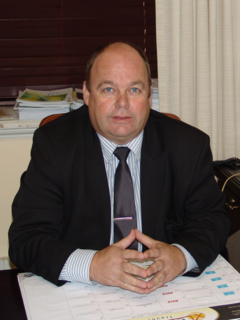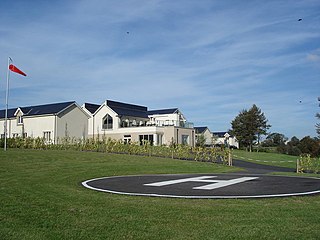
The African National Congress (ANC) is the Republic of South Africa's governing political party. It has been the ruling party of post-apartheid South Africa since the election of Nelson Mandela in the 1994 election, winning every election since then. Cyril Ramaphosa, the incumbent President of South Africa, has served as leader of the ANC since 18 December 2017.

Baleka Mbete is a South African politician who is the Speaker of the National Assembly of South Africa serving since May 2014. Previously she was Speaker of the National Assembly from 2004 to 2008 and Deputy President of South Africa from 2008 to 2009 under Kgalema Motlanthe. She was elected National Chairperson of the African National Congress in 2007 and re-elected in 2012 and served until 18 December 2017. On the 18th of December 2017 during the ANC's 54th conference her position as National Chairperson was succeeded by Gwede Mantashe.

South Africa's Public Protector is one of six independent state institutions set up by the country's Constitution to support and defend democracy.

South Africa held national and provincial elections to elect a new National Assembly as well as the provincial legislature in each province on 22 April 2009.

The Strategic Defence Package or the Strategic Defence Acquisition, popularly referred to as the Arms Deal was a South African military procurement programme. It involved a US$4.8 billion purchase of weaponry by the African National Congress government led by Nelson Mandela in 1999. It has been subject to repeated, seemingly substantive, allegations of corruption.
Julius Sello Malema is South African politician who is a Member of Parliament and the leader of the Economic Freedom Fighters, a far-left South African political party, which he founded in July 2013. He previously served as President of the African National Congress Youth League from 2008 to 2012. Malema was a member of the ANC from the age of nine until his expulsion from the party in April 2012 at the age of thirty-one. He occupies a notably controversial position in South African public and political life, having risen to prominence with his support for ANC president, and later President of South Africa, Jacob Zuma. He was described by both Zuma and the Premier of Limpopo Province as the "future leader" of South Africa. Less favourable portraits paint him as a "reckless populist" with the potential to destabilise South Africa and to spark racial conflict.
Vusumzi "Vusi" Pikoli is a South African advocate and the former head of South Africa's National Prosecuting Authority. He is noted for instigating criminal charges against disgraced South African police commissioner Jackie Selebi and ANC president Jacob Zuma. In 2008 he was suspended from his duties by President Thabo Mbeki, a close confidant of Selebi, and then subsequently fired by Mbeki's successor, Kgalema Motlanthe, who is an ally of Zuma. As such, opposition parties and sections of the press have claimed Pikoli is the victim of two separate political conspiracies. In October 2014 Pikoli was appointed as the Western Cape's first police ombudsman by Premier Helen Zille, whose choice was unanimously backed by the provincial legislature's standing committee on community safety.

Bhekokwakhe "Bheki" Hamilton Cele is the South African Minister of the Police, since 26 February 2018 and was the National Commissioner of the South African Police Service until October 2011, when he was suspended from duty, due to allegations of corruption. He was appointed to this position in July 2009, replacing Jackie Selebi, who was suspended in January 2008 following charges of corruption. Previously he held the post of Member of the Executive Council (MEC) for Transport, Safety and Security in KwaZulu-Natal. He is a member of the African National Congress.

The 2014 South African general election was held on 7 May 2014, to elect a new National Assembly and new provincial legislatures in each province. It was the fifth election held in South Africa under conditions of universal adult suffrage since the end of the apartheid era in 1994, and also the first held since the death of Nelson Mandela. It was also the first time that South African expatriates were allowed to vote in a South African national election.

Pieter van Dalen is a South African politician in the National Assembly of South Africa with the Democratic Alliance (DA).
Thulisile Nomkhosi "Thuli" Madonsela is a South African advocate and Professor of law, holding a chair in social justice at Stellenbosch University since January 2018. She served as the Public Protector of South Africa from 19 October 2009 to 14 October 2016. In 1996, she helped draft the final constitution of South Africa promulgated by then President Nelson Mandela.
Events in the year 2013 in South Africa.
State capture is a type of systemic political corruption in which private interests significantly influence a state's decision-making processes to their own advantage.
Azwihangwisi Faith Muthambi is the former Minister of Public Service and Administration and former Minister of Communications of South Africa.
The Gupta family is a wealthy Indian-born South African family whose most notable members are the brothers Ajay, Atul, Rajesh "Tony" Gupta as well as Atul Gupta's nephews Varun, and US-based Ashish and Amol. The Gupta family owns a business empire spanning computer equipment, media and mining, and has been the focus of widespread scrutiny because of its close ties to Jacob Zuma during his Presidency.

Economic Freedom Fighters v Speaker of the National Assembly and Others; Democratic Alliance v Speaker of the National Assembly and Others [2016] ZACC 11 is a major judgment of the Constitutional Court of South Africa which finds that President Jacob Zuma breached the South African Constitution by failing to implement the recommendations in the Public Protector's Nkandla report.




















